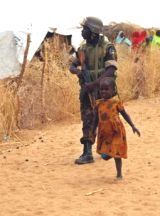Darfur peace mission stumbles, envoys criticised
By Opheera McDoom
July 7, 2007 (KHARTOUM) — Joint U.N.-African Union efforts to stop violence in Darfur have stumbled amid rebel bickering and an upsurge in violence, and the mission’s envoys are poised to miss an August deadline to launch peace talks.
 Seven months into their mission, U.N. peace envoy Jan Eliasson and his AU counterpart Salim Ahmed Salim have made scant progress in bringing fractious rebel groups to the table, drawing accusations of foot dragging from aid groups and observers.
Seven months into their mission, U.N. peace envoy Jan Eliasson and his AU counterpart Salim Ahmed Salim have made scant progress in bringing fractious rebel groups to the table, drawing accusations of foot dragging from aid groups and observers.
Darfur’s three main rebel factions have split into more than a dozen groups in disputes that have fuelled lawlessness in the African state’s remote, violent region.
The envoys have set a self-imposed August deadline to launch peace negotiations and have called an international meeting in Libya for July 15-16 to discuss their progress.
But analysts say they are still a long way from even the first step of bringing together the diverse rebel groups, only one of which subscribed to an AU-mediated peace deal last year.
“It seems unlikely they will be able to have talks in August… given the lack of progress on the rebel unification front,” said Dave Mozersky of the International Crisis Group think tank.
International experts estimate 200,000 people have died in the conflict, which began in 2003 when mostly non-Arab rebels took up arms after accusing the central government of neglecting the arid region.
Khartoum mobilised Arab militias, called Janjaweed, to quell the revolt. Washington calls its actions genocide, but Khartoum rejects the term and says only 9,000 people have died.
“PART-TIME JOB”
Those working in Darfur’s aid operation — the world’s largest — complain the envoys are only doing a “part-time job”.
Neither are based in Sudan and even Eliasson’s special assistant Pekka Haavisto, appointed to make up for his absence, does not live in the country.
“One of the main concerns is the little time spent in country by the key players, considering the scale of the conflict,” said one source in the aid community in Khartoum.
Mozersky said they needed to be much more proactive to unify the rebel groups, broaden the negotiation base and get the government to agree to changes to last year’s peace deal.
“It’s not clear what the … mediation team is actually doing to implement the steps they set out,” Mozersky said. “The time that’s passing could have been spent more efficiently.”
The previous talks took almost two years in Nigeria’s capital Abuja, dogged by continued fighting and rebel divisions and pressured by international deadlines, to reach last year’s deal, which a majority of insurgents rejected.
The divisions have continued. As Eliasson arrived for his latest visit, the rebel Justice and Equality Movement (JEM) reported a further split after Chairman Khalil Ibrahim sacked his military chief, prompting defections by field commanders.
JEM has at least four factions, and the rebel Sudan Liberation Army (SLA) is split into even more groups.
Some, such as SLA commander Jar el-Neby’s large sizeable group and JEM’s Ibrahim, say they will attend broader talks.
But Abdel Wahed Mohamed el-Nur, founder and chairman of the original SLA that has since split, has set tough demands for his attendance, including a no-fly zone across Darfur and an oil-for-food scheme to attract more aid.
And although Nur has few loyal troops on the ground, most of the 2.5 million languishing in Darfur’s refugee camps say they will only accept a peace deal if he endorses it.
The aid community also said talks would be impossible unless security improved. There have been 30 attacks in as many days on its operations, raising the stakes for the 14,000 aid workers who face daily threats of carjackings, abductions and looting.
“We need to have some sort of indication that all these parties to the conflict are going to stop attacking us and each other before peace talks, and that’s just not going to happen,” the source from the aid group said.
(Reuters)
